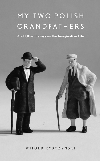
My Two Polish Grandfathers And Other Essays On The Imaginative Life
Witold Rybczynski
Simon & Schuster Canada
$32.99
cloth
228pp
978-0-7432-3598-3
As Rybczynski puts it, if his parents weren’t the only displaced people during World War II, what they went through makes a nice miniature of Poland’s experience of it. After Hitler’s invasion Rybczynski’s father escaped from a Romanian internment camp and drove from Budapest to Paris, where he joined the regrouping Polish forces under General Sikorski. His mother stayed on in Warsaw through the siege, wangled a visa to Italy by claiming her health required sunshine, and from there made it to France, where she was reunited with her husband just in time for another German invasion. In June 1940 the couple escaped on a Dutch collier to Glasgow and served in yet another reconstituted army, as two of over 250,000 Poles eventually stationed in the UK.
These were tough, enterprising people, the sort of immigrants whose children go far. You don’t learn much more about their personalities than that, and can infer little more about their son, because Rybczynski is reticent to a fault and nearly as dry. His parents’ story goes on for 60 pages – hardly enough to explain a war or a family – thanks to information about where they were and what positions they held, plus a potted historical and political background.
The story picks up when the author becomes an architect, after a reticent adolescence in St Johns (now St-Jean-sur-Richelieu), where his family arrived in 1952. Rybczynski got his professional start in the 1960s, when public housing was the architectural hot topic and Montreal was a happening place for designers. He worked for the Habitat-era Moshe Safdie, and then as part of a team adapting a Buckminster Fuller invention for developing-world housing. This is where the reliably interesting author of The Most Beautiful House in the World reveals himself: working out problems, getting excited about the process of learning.
It’s also here that he makes his nearest attempt at self-revelation. He was chumming around Ibiza with some of the first hippies when he had such a nice LSD experience that, he says, he decided not to try it again. And that’s it. Like his references to girlfriends, it leaves you wondering why he mentioned the subject at all. The author has a way of telling stories about himself that make him sound what his hippie friends would call terminally uptight. It’s when he starts talking about his work that you understand why he had so many friends.
The book ends with a portion of his boat-house story from Beautiful House, essentially unchanged and emphasizing the piecemeal nature of this collection. His two overt themes, travel and architecture, never come together beyond the fact that he learned something everywhere he went; and most of what he demonstrates to have learned comes from hands-on experience. In spite of his stated motive for writing this book, to understand the past, he seems to be the kind of forward-looking, problem-solving individual for whom the past is fundamentally uninteresting.
So the titular Polish grandfathers come and go briefly and lifelessly, as family fairy tales illustrating two possible attitudes towards the world: action or retreat. What made the young Rybczynski choose one over the other, and how exactly his parents, let alone his grandparents, decided his profession, remain mysteries. mRb






0 Comments